The online conference aims to invent new avenues for playful and imaginative future developments of our economy. We will explore alternative value systems for new economic thinking and doing, together with academics, artists, researchers, trend forecasters and designers. The conference is divided in the three main threads #Nature’s Economies, #Shifting Value and #Re-designing Infrastructures. (See ABOUT)
Timetable
10:00 - 11:40 CET | Re-designing Infrastructures
Following the Breadcrumbs
Olga Mink and Koen Snoeckx
Introduction and recap of Economia: The Limited Edition so far by director of Baltan Laboratories Olga Mink and editor of the Economia Lab and moderator of the Economia conference Koen Snoeckx.
Possible strategies of Imagining the Unimaginable
Austin Houldsworth
Imagination and creativity are often lacking when the subject matter of money arises. Even highly imaginative genres like science fiction, often struggle to conceive money as anything other than a plot device or a none entity.
Houldsworth’s research has yielded strategies that allow the radical re-conception and design of currency systems and monetary artefacts, through the application of a redefinition design approach.
Dr Austin Houldsworth is a multidisciplinary design practitioner, researcher, educator and expert in critical & speculative design practice. He is a lecturer at Huddersfield University, associate lecturer at the Royal College of Art and Sheffield Hallam University. He also is founder of the ‘Future of Money Design Awards’.
His work strives to leverage change through the application of design within unfamiliar disciplines. Like reimaging and redesigning monetary systems (‘For moneys sake’ 2018). Building the world’s first prototype human fossilisation machine. Or recently founding the ‘Intergalactic Space Agency’ at the Eden Project.
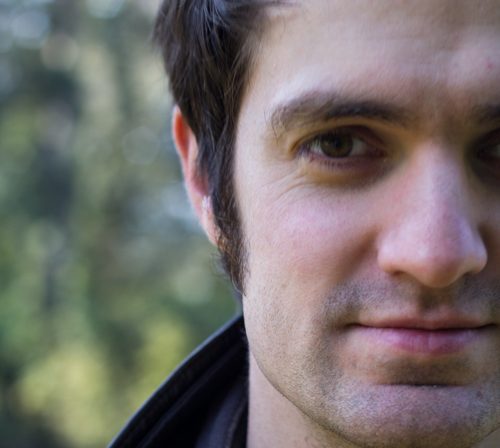
Post-Growth Entrepreneurship
Melanie Rieback
In the Information Age, new technologies and data-gathering power growth and change. Companies are addicted to exponential growth. But is this good for our planet and our society? In recent years social entrepreneurship claims to offer an alternative – but something still doesn’t feel right. As the founder of the world’s first not-for-profit computer security consultancy company, Melanie Rieback’s talk will combine her practical experience building “nonprofit businesses” with the macroeconomic theory of “post-growth” economists like Tim Jackson and Kate Raworth. This talk will question everything that you know about entrepreneurship, provide practical tools to build something different, and then offer you a blue pill and a red pill. Can you go back to “business as usual” again?
Dr. Melanie Rieback is the CEO/Co-founder of Radically Open Security, the world’s first non-profit computer security consultancy company. She is also a former Assistant Professor of Computer Science at the Free University of Amsterdam (VU) who performed RFID security research. Melanie worked as a Senior Engineering Manager on XenClient at Citrix. She was also the head researcher in the CSIRT at ING Bank.
Melanie was named 2010 ICT Professional of the Year (Finalist) by WomeninIT, one of the 400 most successful women in the Netherlands by Viva Magazine in 2010 and 2017, one of the fifty most inspiring women in tech in 2016, 2017, and 2019. She was also called the Most Innovative IT Leader by CIO Magazine in 2017, and one of the 9 Most Innovative Women in the European Union in 2019. Her company, was named the 50th Most Innovative SME by the Dutch Chamber of Commerce in 2016.
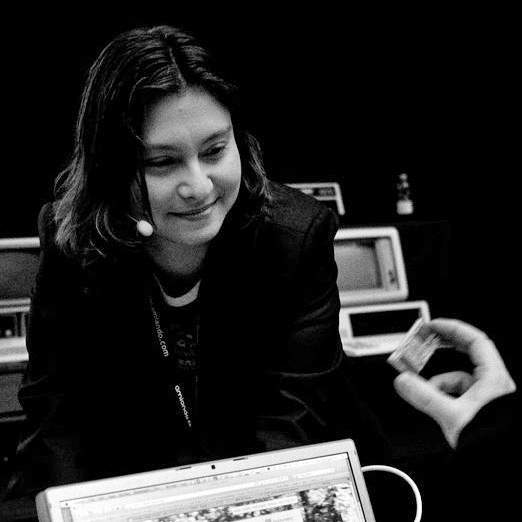
The Hermetic Bank Card
James Richards
Everyday, with a wave of our hands we manipulate hidden fields and virtual clouds to buy what we need to eat, drink, sleep and travel. What kind of arcane magic is this?! Why contactless of course…
But what would it be like if the rituals and practices of our everyday contactless transactions, were more significant and could lead us to a deeper understanding of what these interactions mean for us, our personal, national and global economies. The ‘Hermetic Bank Card’ will consider how contactless bank cards and their readers can figure more prominently in the fabric of our economic lives. We’ll explore how the shape and weight of the card has been formed over time, and what that acceptance means for us. What would an NFC bank card made of concrete feel like to carry and use? How would a screaming bank card, or one which announced our level of financial liquidity or debt at the point of transaction help us to re-imagine our economies for a fairer and more diverse world?
James Richards is the director of Chromatrope, a UK based innovation and development consultancy. He’s undertaken research for clients on topics including ‘the affordances of data’, the ‘public service internet’ and ‘the future of content’
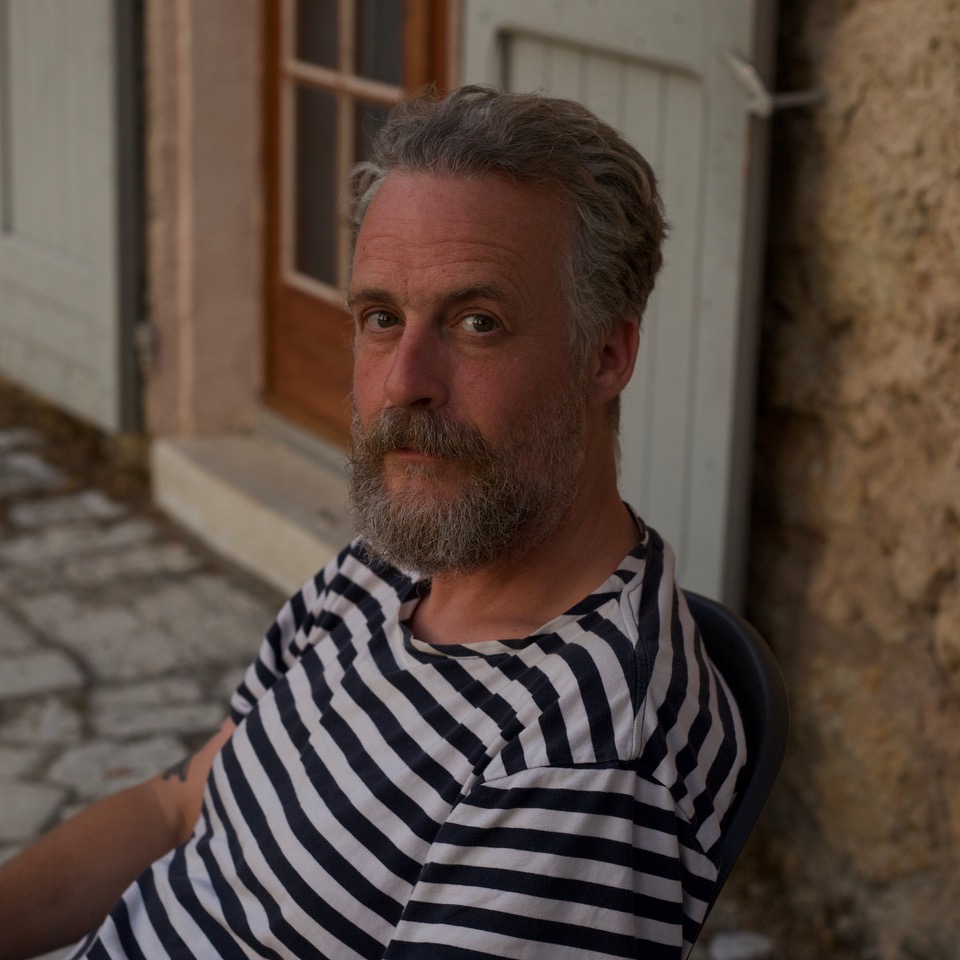
The Republic of Uzupis
Max Haarich
“28. Everyone may share what they possess. 29. No one can share what they do not possess.”.
These are two articles of the constitution of the Republic of Užupis, which might be an inspiring example of a real attempt to base economy on commons. Užupis is a self-declared independent republic in the heart of Vilnius. It is a community of artists, writers and philosophers that create and defend their own Utopia.
Before the breakdown of Soviet Union, Užupis was a totally run down area dominated by poverty and violence. Then, artist settled there and literally tried to survive. They wanted to strengthen the cohesion of the residents with a shared community movement: their own Republic. In 1997 they determined their own government, wrote their own constitution and even established their own central bank with their own currency, the UZ-EUR, though only valid on April 1st. One UZ-EUR equals the value of 0,5 liters beer at the governments bar. This makes it one of the most stable currencies in the world.
Max Haarich is a Munich-based freelance consultant on ethics in Artificial Intelligence (AI) and ambassador of the Republic of Užupis. He studied communication science in Aachen (DE) and political theory in New York (US), and worked as a research assistant on innovative capability and general AI. During his time as a manager at Europe’s leading innovation and start-up center UnternehmerTUM, he founded the Munich Embassy of the Lithuanian artist republic Užupis. The embassy builds bridges between arts and technology and engages in policy making for ethical AI.

The Economy of the Frontier
Oli Sorenson
The economic imperatives towards permanent growth are deeply engrained in the human psyche, and particularly in the American Frontier mindset. The territories to the West of the new United States promised unlimited land that was essentially free for the taking. Even when hitting the continent’s natural boundary set by the Pacific Ocean in California, Americans continued their expansion through technological innovation, onto the unchartered territories of cyberspace. Yet such ventures still play by the rulebooks of the Frontier, by distorting our common understanding of ‘freedom.’ Indeed, technological innovators often stay ‘free’ from existing market regulations that protect consumers, while remaining ‘free’ to maximize their economic expansion.
Oli Sorenson is a remix artist and scholar, first recognized in London, after taking part in media art events at the Institute of Contemporary Art (2003-06), Tate Britain (2006), and the British Film Institute (2008-10). He established an international profile when performing at ZKM (Karlsruhe, 2002), ISEA (Helsinki, 2004), Mapping (Geneva, 2009) and Sonica Festivals (Ljubljana, 2012). Based in Montreal since 2010, Sorenson worked more recently on exhibition projects at The Power Plant (Toronto, 2014), FILE (Sao Paulo, 2015), Monitoring (Kassel, 2017) and Art Mûr (Berlin, 2018). In 2017, he completed a doctoral project entitled ‘The Material Conditions of Immaterial Arts,’ and now lectures part-time at Concordia University, Montreal.

12:45 – 14:30 CET | Shifting Values
Motivation Architecture
Attila Bujdoso
Attila Bujdoso suggests a new concept for designing cooperative human systems where non-material motivations play a key role in engagement and participation. This concept he calls motivation architecture. Motivation architecture is the structural design of a social system. It focuses on the participants involved, their contributions and their motivations. It describes the interrelations of participants and their motivations and contributions among themselves and in relation to the collective effort. As a practice, motivation architecture aims to design and build cooperative human systems which are motivationally balanced – and therefore successful and sustainable.
Attila Bujdoso works as lead UX designer at the world’s largest investment management company. Selected by Kreatív as one of top 25 creative minds in Hungary, he is especially interested in areas where technology, culture and society meet and interact. Attila has a background in architecture, has worked on award-winning interactive design projects at the Kitchen Budapest new media research lab and is editor of the book Social Design Cookbook, published in 2019.

Disturbance in Finance and Art
Mladen Bundalo
“Uncertainty principle” is a cluster of reflections which explore the phenomenology of general and personal feelings of indeterminacy when it comes to the modern financial economy, as well as the problems of locating, employing and manipulating values. In particular, we delve into the focal concepts and experiences of the financial economy, such as the idea of financial asset, GDP, or globalized online markets. They are de-totemized and stripped of their practical economic function, becoming critical statements, arte povera, cyber video essays, artistic currencies.
Mladen Bundalo is an interdisciplinary artist working on a visual, dialogical, and autoethnographical system addressing movement, exchange, value, inflation, temporality, compatibility, and uncertainty, as nodal categories in the experience of modern society.

Art Value App
Vygandas ‘Vegas’ Simbelis
The project “Art Value” is examining the notion of political economy and neoliberal values in the art processes, i.e. production, circulation and consumption. The economy standards and its influences to the art world and to creation in general is a key theme of the project. Critically appropriating principles of such dichotomy discourse, the artist seeks for a synthesis between those two different and opposite paradigms.
Vygandas “Vegas” Simbelis, artist name – Das Vegas (Lithuania/Sweden), is a contemporary (media) artist and researcher. With degrees in art and design from art academies, the highest attainment in the field is a Licentiate of Arts degree and a PhD (doctorate) at the KTH Royal Institute of Technology in Stockholm, Sweden. Having extensive experience in fine art and design, Vegas critically examines new territories and conducts research questioning the role of art (and artist) in relation to our contemporary society and with its socio-political implications.
I'd Rather Own Nothing
Bamidele Awoyemi, Jason Liu & Tzen Chia
The Life Subscription Agency is an organisation devoted to handle the entirety of a user’s life for them, from food and clothes to homes and personal devices, we take care of it all! Each of our members trade as many ownership rights as they want, giving us the chance to tailor their life experience to their needs. If you can own it, we can own it better…
THE LIFE SUBSCRIPTION AGENCY is a fictional bureau of the future. This playful research project seeks to speculate on the state of contemporary ownership and subscription, while provoking discourse over its relevance on society and the built environment. Under the guise of the agency, we have contributed to the Oslo Triennale in the form of Manifesto known as ‘A Handbook for the Person Who Owns Nothing’
Bamidele obtained his BA at Canterbury School of Architecture and an MA in Architecture at The Royal College of Art in London. His research explored the influence of digital determinism on our choices and free will, even permeating to political scales.
Jason holds degrees of Architecture from University of Bath and Royal College of Art. He has interests in behavioural science, geopolitics, social urbanism, art, technology and film, which has are being explored in his projects and researches.
Bridging the gap between theory and reality, Tzen’s diverse interests, previous experience in architecture and the industries surrounding it namely publishing, art and fashion, have contributed to her approach to design, culminating in the practice and expression of architecture.

Social Art in Spaces of Transitional Living
Jody Wood
This presentation addresses economic paradigms that influence notions of caretaking in anti-poverty support agencies. Wood articulates what equality might look like outside of bottom-line bureaucratic functionality, wherein transitional housing agencies function to provide fixed services within an ongoing and largely unchanged social order. She discusses these issues in the context of two of her long-term socially engaged art projects, Beauty in Transition and Choreographing Care both working within homeless service agencies. Beauty in Transition was a pop-up mobile hair salon offering free haircare for transitional housing residents. Choreographing Care started as a socially engaged art project and was adopted into an emergency shelter in Charlotte North Carolina.
Jody Wood uses mediums of social practice, video, photography, and performance. Her recent work reimagines routines in poverty support agencies, aiming to sculpt power dynamics, relationship networks, and resist stigmas surrounding poverty.

Concluding Day #1
Concluding this first day of the Economia conference with a recap from moderator Koen Snoeckx and time for discussion and conversation.
10:00 – 11:45 CET | Re-designing Infrastructures
Isabot: Investing in a post-labour future
Ottonie von Roeder
At the Economia festival Ottonie von Roeder will discuss the obsolescence of human labour, our participation in technological progress, why the abolition of labour can give as more freedom to work and how targeted financial investment could accelerate a post-labour future. She will present the process and output of her collaboration project with Baltan Laboratories and the Eindhoven-based accountancy firm Joanknecht – a chatbot that helps you to decide how to invest your money in order to speed up the automation of your own job.
Ottonie von Roeder is a designer working in the field of critical and social design, design research and education. She applies speculation and playfulness to question existing socio-political systems.
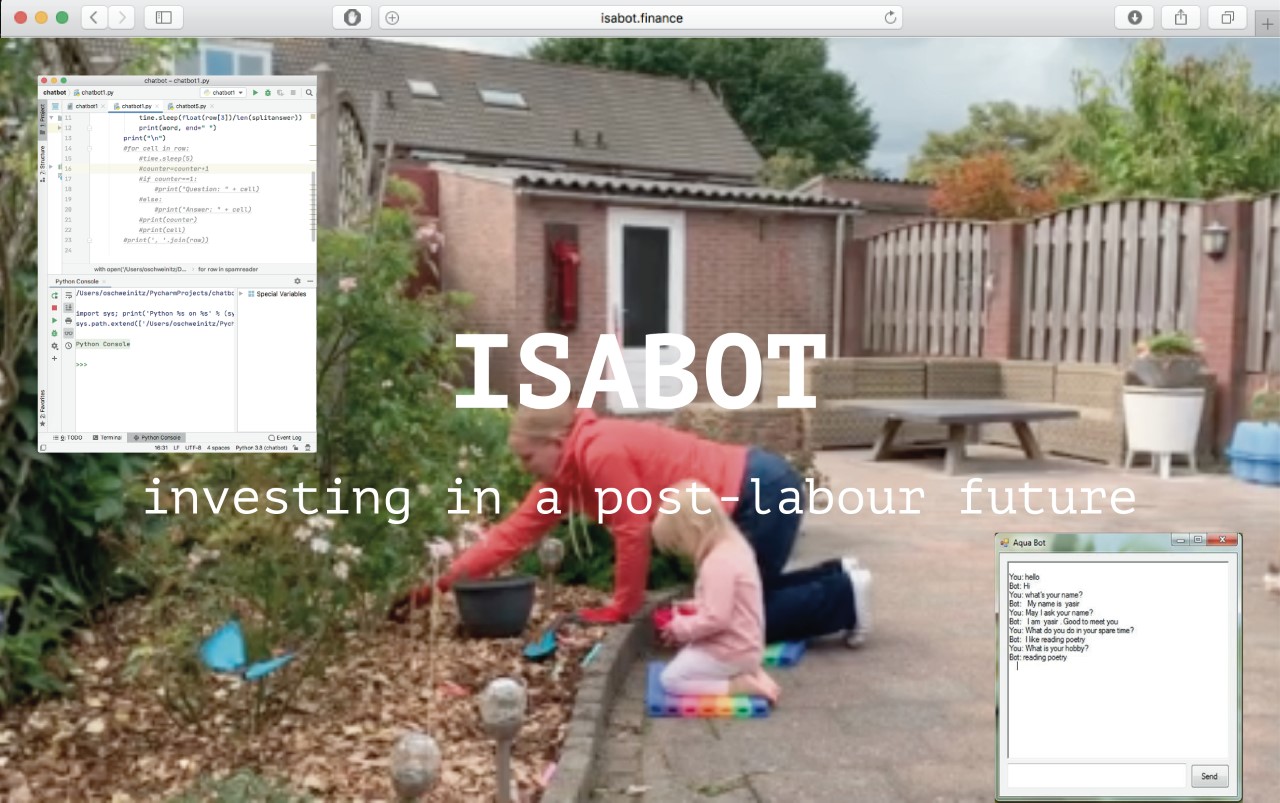
Community Coins
Diana Kretschmann
As we enter the Transition 2020s, all over the world citizens are taking over. They set up cooperatives, start community gardens, trade among themselves and organise their own energy supply. They are doing things differently so our communities can overcome these exciting but challenging times of change and transition.
The Community Coins project is part of this “commons” movement. Like other bottom-up initiatives we are building a new society from below. With Community Coins we are rethinking the traditional dichotomy of paid work versus volunteering. What if we could create a new domain of work, somewhere in the middle? Our well-being largely depends on volunteers and citizens doing good. Yet, the problem is that many people experience a lack of time or money to become active for causes they care about. People get stuck in what the American anthropologist David Graeber calls bullshit jobs while daily costs and commitments prevent them from becoming active.
Diana Kretschmann (1974) is a sociopreneur from Eindhoven. She considers herself a social hacktivist and a radical optimist. She is convinced that we have all that we need to start building the new economy and create a better world in which more people can do meaningful work on a sustainable basis. She is the chairwoman of the Possible Today Foundation. This foundation aims to empower local communities and increase social resilience by introducing new ways of working, living and consuming. To this purpose, the foundation uses social co-design (i.e. designing together with the target groups) and tech for good.

Basic Income Café
Martina Huynh
How can design research contribute to both democratize and enrich the debate on alternative economic models and find out what relation between work and income are desirable?
How can design research contribute to both democratize and enrich the debate on alternative economic models and find out what relation between work and income are desirable?
Martina Huynh (1992, Switzerland) is an independent designer based in the Netherlands. In early 2018 she graduated cum laude from
the Design Academy Eindhoven with her project Basic Income Café, which was nominated for the Dutch Design Awards 2019 – category Design Research.
With a strong conceptual focus, Huynh playfully translates research on societal developments into interactive experiences and multimedia installations. Since 2018 she is co-founder of design studio Cream on Chrome together with Jonas Althaus, where they explore the social and political implications of emerging technology. Their newest project 4-D News was shown in multiple European countries.

Investing Time
Josef Bares
As increasing numbers of jobs bring no added value, could that mean that the money received in return brings no added value either? The proverbial equality of time and money must be questioned. The nascent discussions regarding unconditional basic income suggest money without work. The unprecedented increase in monetary supply (e.g. ECB stimulus program) is out of sync with the largely constant (labor) time-supply. The classical demand-supply model would suggest that the value of time must have increased. The economist’s explanation of the effects is a matter-of-fact one: wages rise, prices rise, and inflation increases. However, I suggest to use this moment as a pivot to depart from this line, and to redefine work as an activity of investing time, not earning money.
Investing time means to be aware of its scarcity. Time cannot be manufactured or accumulated as easily as money. Investment also means, as Bernard Stiegler and Rudolf Steiner suggested, a capital of confidence in the future; a desiring projection of imagination. Using time as the decision-making currency and relegating money to its historical role as a medium of exchange is a vital transformation needed to thrive in a society which focuses on well-being rather than wealth.
Josef Bares dedicates his work to the semiotic investigation of consumer transactions and cognitive labor. He received a degree in international business and economic history in 2009 and a degree in intermedia arts in 2010. His art-practice based research into decision making under cognitive capitalism lead to the award of a doctoral degree in philosophy in 2016. He has contributed to books published by ISEA in 2016, Baltan Laboratories in 2018 and RIXC in 2019.
How do you queer the spreadsheet...
Alessandro Ghio, Nick McGuigan & Lisa Powell
How do you queer the spreadsheet / developing a queering accounting manifesto? This presentation aims to explore the language of modern economics and business – accounting – through queer lenses. This will be done by focusing on roundtable discussions occurring between queer artists, accountants and academics on how we might go about ‘queering the spreadsheet’ and culminating in the presentation of The Queering Accounting Manifesto.
This manifesto represents a dissatisfaction with the status quo. Shining a light on heteropaternalism and destructive binaries to provide the momentum for fundamental change in accounting, accountability and the accounting profession dominated by today’s heteronormative, paternalistic and patriarchal ‘norms’. By taking economic thought and accounting logic as a playground, this newly formed queering accounting manifesto seeks to prepare us for the new types of governance and accountability the world requires under an economy of the commons.
Alessandro Ghio Assistant Professor in Accounting, Monash Business School (Australia). Alessandro holds a Ph.D. in financial accounting from ESSEC Business School and a Ph.D. in management from the University of Pisa. His research focuses on issues surrounding the sociology of the accounting profession and corporate social media communication. He is the co-instigator of the project “Queering Accounting” and has led and/or taken key roles in competitive research funded projects to study social mobility in education and practices supporting women accountants. Alessandro received the Best Paper Award at the 2018 IAAER World Congress and the 2019 Aspen Institute Award ‘Ideas Worth Teaching’. Prior to joining Monash University, Alessandro has been a controller in a large telecommunication organization, a consultant for the Italian Ministry of Education on social mobility in education and a visiting scholar at Indiana University.
Nick McGuigan Director of Equality, Diversity and Social Inclusion and Associate Professor in Accounting, Monash Business School (Australia) as well as Co-Instigator of The Accountability Institute1. His work revolves around student conceptions of learning, Integrated Reporting, innovation, systems design and regenerative economics. He has led and taken key roles in Federal State level grants in both Australia and Germany. Nick has published widely in international accounting and education journals and been invited to present at research centers and professional organisations all around the world. An award-winning educator, he instigated Monash Business School’s newly created Artist-In-Residency program, conceptually designed the world’s first ever accounting perfume and together with the accounting profession is embarking on research that investigates a Queer perspective of accounting.
Lisa Powell Assistant Professor in Accounting at Monash Business School (Australia). Lisa incorporates creativity, innovation, and interdisciplinary aspects into accounting education. Lisa’s research interests include empathy and emotional intelligence, psychology, design thinking, and diversity and inclusion in accounting education. Lisa believes in challenging heteronormativity in accounting education to create a more inclusive educational environment for students and faculty.
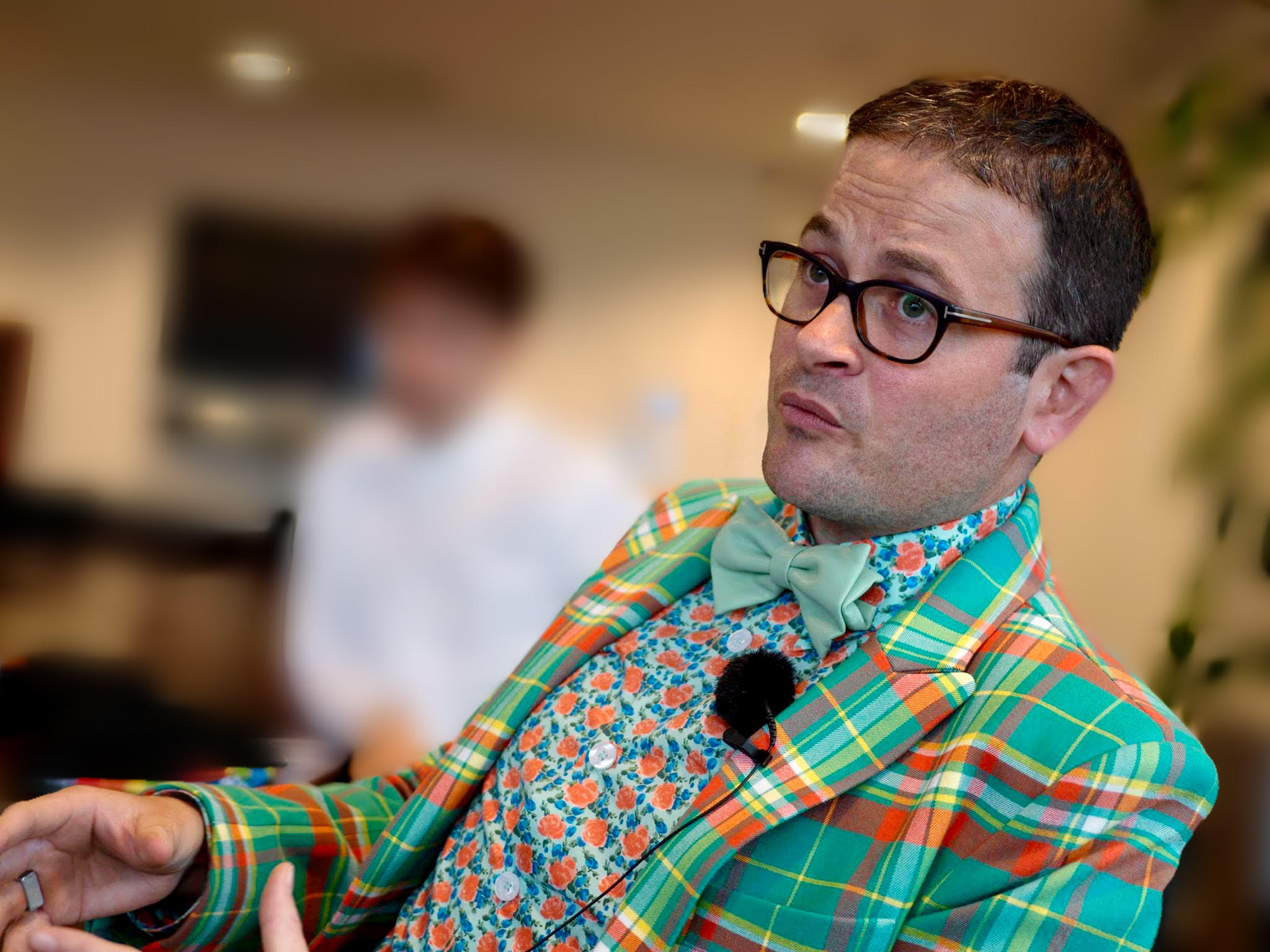
12:30 – 14:00 CET | Nature’s Economies
Mirroring biology: the necessary evolution of the economic and financial system
Martin Schmalzried
The economy and the financial system would have indeed much to learn from Nature.
In order to imagine an economic and financial system which would optimally allocate resources, one doesn’t have to go any further than examining how their own body functions. If one thinks of each human as being one cell inside a global, collective organism, then central banks and private banks are like the respiratory and circulatory systems in our body. The respiratory system is in charge of regulating the “overall” available basic source of energy (oxygen) by breathing slowly or fast (raising or lowering interest rates, buying bonds), the other (the circulatory system) is in charge of distributing that available energy in (normally) an efficient way, depending on the needs of your body. At the present time, QE can be understood as hyperventilation, that is, the act of breathing deep and fast, while doing nothing “productive”, the result of which can be dizziness or even passing out (getting too much oxygen while not consuming it for a concrete physical “need”). In today’s economy, a lot of money is created, but only for speculative purposes, not based on the needs of the overall economy, and actually threatening to crash it (the same as passing out from too much speculative money overheating select areas of the economy in unsustainable ways).
Martin Schmalzried holds a Master’s Degree from the ULB (Brussels) in Political Science. He has been working at COFACE-Families Europe as a Policy and Advocacy Manager for 11 years. He has been responsible for the portfolio of financial services since January 2009. He is a Member of the Financial Services Users Group (FSUG) of the European Commission (DG FISMA) since 2013, a Member of the European Banking Authority Banking Stakeholder Group since 2016 and freshly appointed as a Member of the European Insurance and Occupational Pensions Authority Insurance and Reinsurance Stakeholder Group. His areas of expertise are financial inclusion, creditworthiness, Big data in financial services, fintechs, blockchain and crypto-assets.

Curating Ecomedia Art
Kimberley Bianca
This presentation examines ‘ecomedia curating’ as an approach toward eco-sustainable cultural production and reviews the new genre of ecomedia art that facilitates and challenges representations of environmental concerns and the Anthropocene through praxis. Compared to the traditional curatorial process, ecomedia curating gives artists more control of their creative activities and the exchange of artifacts. Curators and cultural leaders have a unique privilege to communicate participatory alternatives to hierarchical and resource-dependent modes of cultural production. Through ecomedia curation, cultural leaders can generate reflective activities in technology-based art and media practices. There is a call to action augmenting this paper for curators of media art to develop means of sharing agency through technology and environmental communication for supporting ecomedia curation.
Kimberley Bianca is a PhD student in Emergent Technologies and Media Arts Practices and is investigating ecologically sustainable media arts. She completed her master’s thesis “Innovating Electrofringe: A Distributed Curatorial Platform for Electronic Art”, while directing the arts organisation and festival, Electrofringe. She has a BS in Art and Technology from Saxion University, where she co- developed the software-based public art project “KaleidOk: Visually Communicating Emotions from Spoken Word”.

From sells pitch to neverending stories
Dan Diojdescu, Mathias Lehner
-
- ‘Replacing the “natural,” that is age-old, processes that have survived trillions of high-dimensional stressors with something in a “peer-reviewed” journal that may not survive replication or statistical scrutiny is neither science nor good practice.’ (Taleb, 2012)
This presentation aims to explore the use of biomimicry[1]and General System Theory (GST) in creating urban narratives with a design and governance inspired by living ecosystems[2]. Biomimicry (e.g. social insects) provides case studies that can inspire new urban narratives. GST provides a framework that can scale up these narratives. For illustration three case studies have been selected Rotterdam (Netherlands), Chandigarh (India) and Auroville (India).
Mr. Diojdescu’s work experience encompasses marketing and communication, financial service, education and research. His research has a trans-disciplinary dimension encompassing biomimicry-digital governance-the commons; sustainable lifestyles and well being; the role of disruptive technologies in building an ecosystems of non-monetary, non-reciprocal interaction in harmony with the environment and the self.
Mathias Lehner is Research Director at nextcity.nl and Program Manager of the Next Step Program at the BNA.
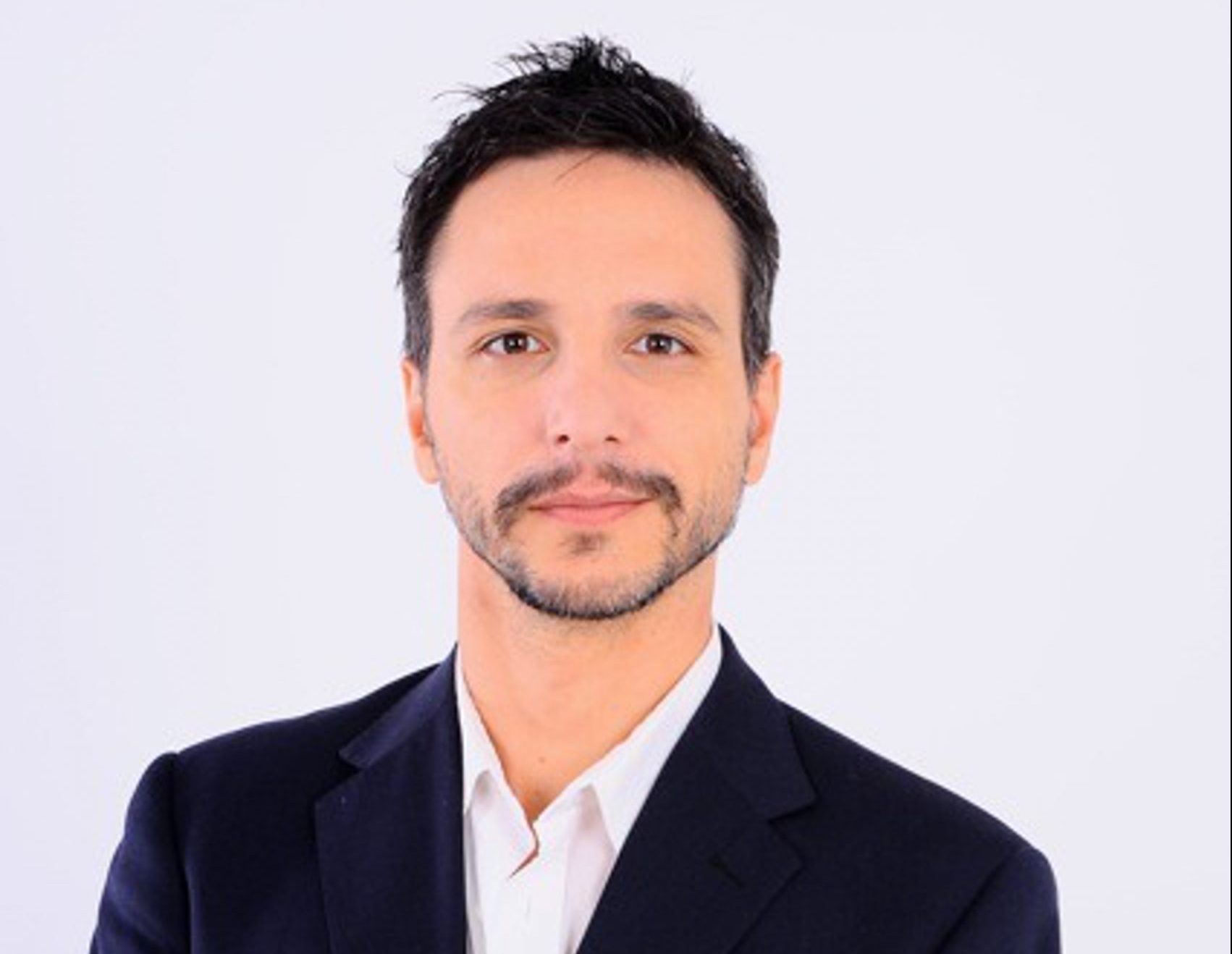
Concluding the conference
Concluding the Economia conference with a recap from moderator Koen Snoeckx and time for discussion and conversation.